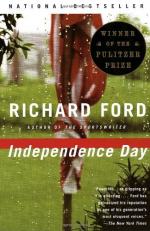|
This section contains 607 words (approx. 3 pages at 300 words per page) |

|
SOURCE: Kennedy, Douglas. “Losing Ground.” New Statesman and Society 8, no. 361 (14 July 1995): 39.
In the following review, Kennedy applauds Ford's Independence Day, calling it a great American novel about suburban American life.
To many, the 1980s were the decade of American excess—that high-rolling era of triumphant avarice, in which upper-echelon urbanites danced to the music of mammon. And a stroll through some of the more visible novels of the era—The Bonfire of the Vanities, Bright Lights, Big City and Less Than Zero—reinforces this image of a society in love with the ethos of the fast-lane, restless in the midst of abundance.
But the most significant novel of the decade did not grapple with the dilemmas of the disaffected, overeducated, overindulged young, or with the lifestyles-of-the-rich-and-vindictive on Wall Street. Instead, it reminded one that beyond the artificial glitz of the Reaganomic boom was an entire suburban middle-class facing...
|
This section contains 607 words (approx. 3 pages at 300 words per page) |

|


